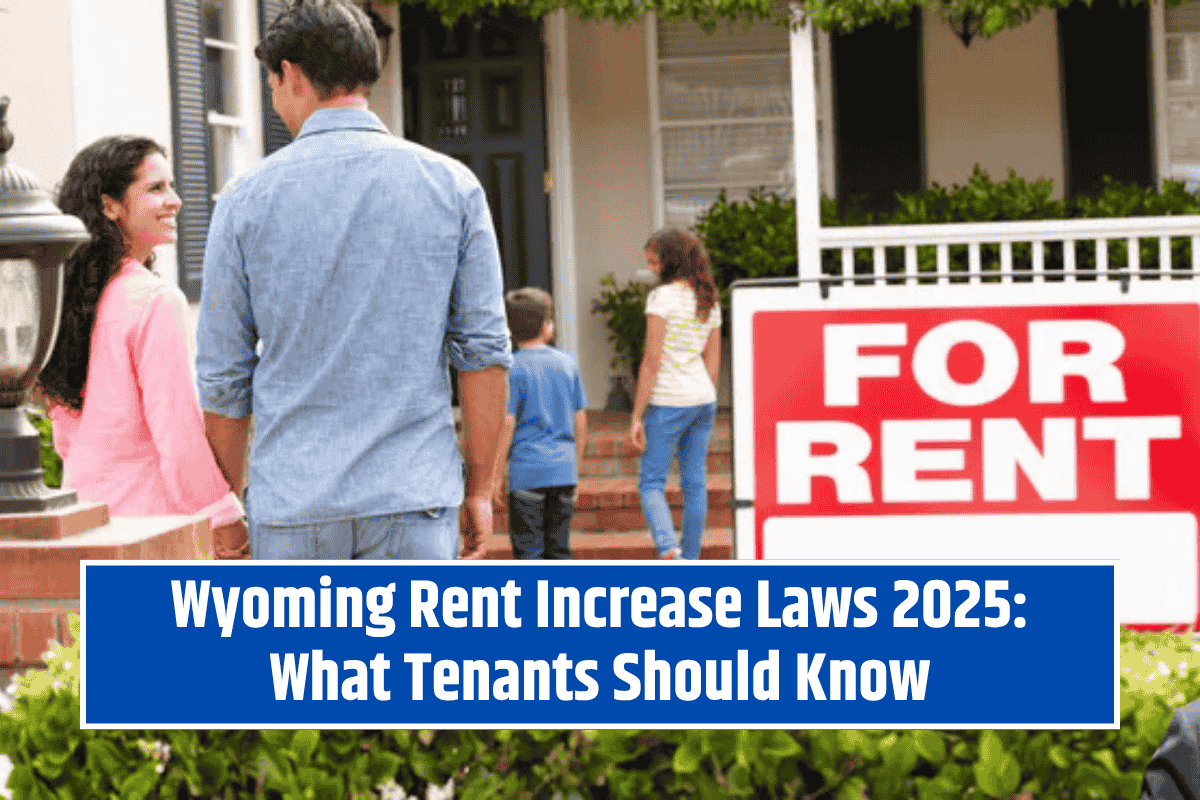As rental markets across the United States continue to fluctuate, tenants in Wyoming are increasingly concerned about how frequent and steep rent increases might impact their finances. The state has specific laws governing how much a landlord can increase rent, and understanding these rules is crucial for renters. As we move into 2025, here’s an overview of what tenants in Wyoming need to know about rent increases and tenant rights.
What Are Rent Increase Laws in Wyoming?
Wyoming is a non-rent control state, meaning that there are no statewide laws that limit how much a landlord can increase rent. However, landlords are required to follow certain procedures to ensure that the rent increase is legal. Understanding the general rules and requirements can help tenants avoid unexpected rent hikes.
1. Notice Requirements for Rent Increases
Under Wyoming law, there are specific rules that landlords must follow when they want to increase the rent. These requirements depend on the type of lease agreement in place:
- Month-to-Month Leases: For tenants on a month-to-month lease, the landlord must provide written notice of the rent increase at least 30 days before the new rent takes effect. This allows tenants enough time to decide whether they want to accept the rent increase or move out.
- Fixed-Term Leases: If you have a fixed-term lease (for example, a one-year lease), the landlord cannot increase the rent until the lease term ends, unless the lease specifically allows for rent increases during the term. In this case, rent can only increase once the lease is up for renewal or the terms are being renegotiated.
2. No Rent Control in Wyoming
As mentioned, Wyoming does not have any statewide rent control laws. This means that landlords can technically increase the rent by any amount, as long as they follow the notice requirements. However, the rent increase must still be reasonable and not discriminatory. For example, a landlord cannot raise the rent based on race, gender, religion, or other protected classes under federal and state fair housing laws.
3. Why Rent Increases Happen
Rent increases can happen for several reasons, and tenants should be aware of the common causes:
- Market Conditions: If demand for rental properties is high and the supply is low, landlords may increase rent to match market rates.
- Property Maintenance and Upgrades: If the landlord has made improvements or repairs to the property, they may increase the rent to cover those costs.
- Taxes and Utility Costs: Increases in property taxes or rising utility costs may also lead to rent increases.
4. Rent Increase During the Lease
If you have a fixed-term lease, the landlord is generally prohibited from increasing your rent during the lease term unless it is specifically allowed in your lease agreement. However, once your lease ends, the landlord can propose a new rental rate, which may be higher, and you can either accept the new rate or choose not to renew the lease.
5. What If a Tenant Disagrees with a Rent Increase?
If tenants disagree with a rent increase, they have several options:
- Negotiate with the Landlord: If the rent increase feels excessive, tenants can try negotiating with the landlord for a smaller increase or a more flexible lease agreement.
- Look for Alternative Housing: If the rent increase is too much to afford, tenants may want to start looking for alternative housing options. Since Wyoming doesn’t have rent control, rent increases can be significant, especially in popular areas.
- Contact Legal Aid or Tenant Organizations: If tenants believe the rent increase is discriminatory, retaliatory, or violates the lease agreement, they can reach out to a legal aid organization or tenant advocacy group for assistance.
6. Retaliation Protections for Tenants
Wyoming law prohibits landlords from raising rent or taking other retaliatory actions against tenants who exercise their legal rights. For example, a landlord cannot increase rent simply because the tenant has complained about repairs, filed a complaint with a housing agency, or joined a tenants’ union. If a tenant believes the rent increase is a form of retaliation, they may have legal recourse.
7. How Tenants Can Protect Themselves
While Wyoming doesn’t have rent control laws, there are steps tenants can take to avoid sudden or unfair rent increases:
- Read Your Lease Carefully: Make sure your lease clearly outlines the conditions regarding rent increases, including when and how increases can occur.
- Understand the Local Market: Research the typical rent prices in your area. This will help you assess whether a proposed rent increase is reasonable or excessive.
- Keep Communication Open: If you’re facing a rent increase, communicate with your landlord. Discuss any concerns and see if there is room for negotiation.
- Know Your Rights: Be aware of your legal rights as a tenant. This includes the right to a notice before rent increases and the right to live in a non-discriminatory environment.
8. Potential Future Changes in Wyoming Rent Laws
While Wyoming does not have rent control at the moment, it’s possible that future legislation could introduce additional protections for renters. Some states have passed laws to limit rent increases, introduce rent stabilization, or provide greater protections against eviction and displacement. Tenants in Wyoming should stay informed about changes to housing laws that could affect their rights.
Understanding rent increase laws in Wyoming is crucial for tenants, as the state does not have rent control. While landlords can raise rent as much as they want, they must follow the legal procedures for notice, especially for month-to-month tenants. By being aware of these rules and taking steps to protect their rights, tenants can better navigate the challenges of rent increases in Wyoming.
